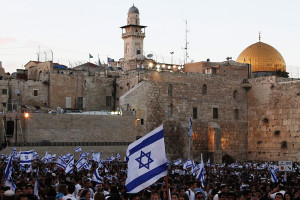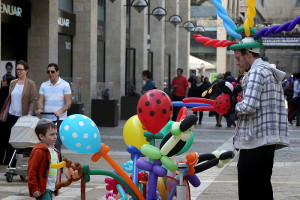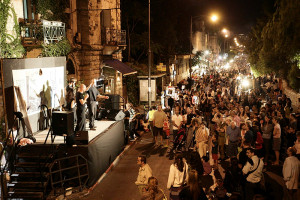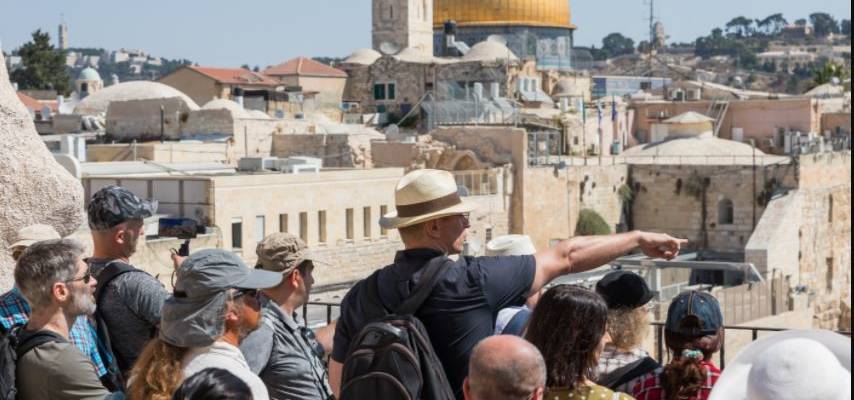Jerusalem Day – “Yom Yerushalayim” in Hebrew – celebrates the reunification of the Holy City of Jerusalem, the eternal capital of the Jewish People, which occurred during the Six Day War on June 7, 1967.
By United with israel Staff
Jerusalem was never the capital of any nation in history except for the Jews. As explained on Virtual Jerusalem (virtualjerusalemlibrary.org), “ever since King David made Jerusalem the capital of Israel 3,000 years ago, the city has played a central role in Jewish existence.”

Jews march to the Western Wall through the Old City as part of Jerusalem Day celebrations. (Photo: Nicky Kelvin/Flash90)
Jews have been living in their beloved Jerusalem continually for millennia. Jerusalem’s total population today is approximately 662,000. In east Jerusalem, which many consider “Arab Jerusalem,” the Jewish population in fact exceeds 225,000, outnumbering the Palestinian Arabs.
The eastern part of Jerusalem was under Jordanian control between 1948 and 1967, until the Jewish State recaptured it in a war of defense.
In 1948, immediately following the creation of the State of Israel, “Jordan invaded and occupied east Jerusalem, dividing the city for the first time in its history and driving thousands of Jews, whose families had lived in the city for centuries, into exile,” the Virtual Jerusalem site continues. “For the next 19 years, the city was split, with Israel establishing its capital in western Jerusalem and Jordan occupying the eastern section, which included the Old City,” where the Temple Mount – the holiest site in Judaism – is located.
Jerusalem Day Celebrates Thriving Multicultural City
During the Jordanian occupation, eastern Jerusalem was gravely neglected; Jews and Christians were prohibited from visiting the holy sites. Under Israeli rule, the city is thriving and has welcomed hundreds of thousands of Muslim and Christian visitors.
“Along with religious freedom, Palestinian Arabs in Jerusalem have unprecedented political rights,” the site points out. “Arab residents were given the choice of whether to become Israeli citizens.”

A street vendor makes balloon animals for sale at the ultra-modern Mamilla mall in the Old City. November 18, 2013. (Photo: Nati Shohat/FLASH90)
Although most chose not to accept Israeli citizenship, they are nevertheless permitted to vote in municipal elections and to play a role in the city’s administration.
As pointed out on keepjerusalem.org, “Jerusalem never appears even once in the Koran. The prophet of Islam never once visited Jerusalem. There is only a Moslem legend that claims that Mohammed was brought to Jerusalem in the dark night by the angel Gabriel.”
The Temple Mount in the Old City is the site of the Holy Temple (completed by King Solomon in 827 BCE), which according to Jewish tradition was built on the Even Hashtiya, the foundation stone upon which the world was created.
As explained on camera.org, this area is “considered the epicenter of Judaism, where the Divine presence rests, where the biblical Isaac was brought for sacrifice, where the Holy of Holies and Ark of the Covenant housing the Ten Commandments once stood, and where the Temple was again rebuilt in 515 BCE before being destroyed by the Romans in 70 CE. The Temple Mount is also known as Mount Moriah, mentioned frequently in the Torah.
Jerusalem Day Recognizes Holy Capital of Ancient Israel
“Jerusalem, Judaism’s holiest city, is mentioned hundreds of times” in biblical literature, the site adds. “It was the capital city of ancient Israeli kingdoms and home to Judaism’s holiest Temple (Beit Hamikdash). Jews from all over the ancient world would make pilgrimages to the Temple three times a year to participate in worship and festivities, as commanded in the Torah. Jerusalem and the Beit HaMikdash have remained the focus of Jewish longing, aspiration and prayers. Daily prayers (said while facing Jerusalem and the Temple Mount) and grace after meals include multiple supplications for the restoration of Jerusalem and the Beit HaMikdash. Jews still maintain the ninth day of the Hebrew month of Av, the date on which both the First and Second Temples were destroyed, as a day of mourning. The Jewish wedding ceremony concludes with the chanting of the biblical phrase, ‘If I forget thee, O Jerusalem, let my right hand forget its cunning,’ and the breaking of a glass by the groom to commemorate the destruction of the Temples. And Yom Kippur services and the Passover Seder conclude each year with the phrase, ‘Next Year in Jerusalem.’”

An arts & crafts fair on trendy Emek Refaim Street in Jerusalem. (Photo: Abir Sultan/Flash90)
Today the City of Jerusalem is also a modern, cosmopolitan center with a diverse population hailing from across the globe. Home to the renowned Hebrew University of Jerusalem and dozens of museums hosting state-of-the-art exhibits – and, of course, the Knesset (Israel’s parliament) – the city boasts numerous attractions featuring culture, art, theater, music and architecture, as well as high-quality restaurants and cafes offering local and diverse ethnic cuisine.
With its holy sites, archaeological digs and modern night life, Jerusalem today is a delightful, lively mix of the ancient and contemporary worlds.
